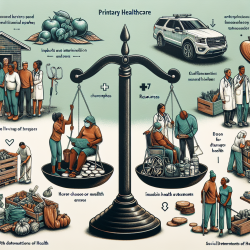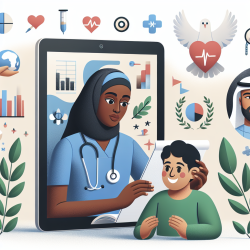Embracing a New Era in Oto-Laryngology: Insights for Practitioners
The field of oto-laryngology has witnessed significant advancements over the decades, with pivotal contributions shaping modern therapeutic practices. One such landmark moment was the Watson-Williams Memorial Lecture, delivered at Bristol University on March 8, 1955. This lecture, encapsulated in the article "The New Outlook in Oto-Laryngology," provides timeless insights that continue to resonate with practitioners today.
As a speech-language pathologist dedicated to data-driven decisions and evidence-based practices, it is crucial to delve into historical research that has laid the groundwork for current methodologies. The lecture by R. Scott Stevenson, a renowned Consultant Ear, Nose, and Throat Surgeon, offers valuable perspectives that can enhance our understanding and application of oto-laryngology in speech therapy.
Key Takeaways from the Lecture
Stevenson's lecture emphasized the importance of integrating innovative techniques and a holistic approach to patient care. Here are some key takeaways that practitioners can implement to improve their skills:
- Holistic Patient Assessment: Stevenson advocated for a comprehensive evaluation of patients, considering not just the symptoms but the overall health and lifestyle factors that may influence ear, nose, and throat conditions.
- Interdisciplinary Collaboration: The lecture highlighted the benefits of collaborating with other healthcare professionals to provide a multidisciplinary approach to treatment, which is now a cornerstone of modern speech therapy practices.
- Emphasis on Continuous Learning: Stevenson encouraged practitioners to remain curious and committed to lifelong learning, a principle that is more relevant than ever in our rapidly evolving field.
Implementing These Insights Today
Incorporating these insights into your practice can lead to improved outcomes for children receiving speech therapy. Here are some practical steps to consider:
- Adopt a Comprehensive Evaluation Framework: Use a holistic assessment approach to understand the broader context of a child's communication challenges, including environmental and psychological factors.
- Foster Collaborative Networks: Build relationships with other healthcare providers, such as audiologists and pediatricians, to create a cohesive treatment plan that addresses all aspects of a child's health.
- Commit to Professional Development: Engage in continuous education opportunities, such as workshops and conferences, to stay abreast of the latest research and techniques in oto-laryngology and speech therapy.
By integrating these principles into your practice, you can enhance your therapeutic approaches and contribute to the development of innovative solutions in speech therapy.
To read the original research paper, please follow this link: The New Outlook in Oto-Laryngology: The Watson-Williams Memorial Lecture, given at Bristol University on 8th March, 1955.










